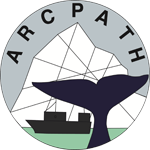Leader Marianne Rasmussen (UoI); Co-Leader Níels Einarsson (SAI).
Participants: SAI, UoI; NSIDC.
WP4 will provide an integrative focus on marine changes in the Arctic, with regard to the linkages between environmental changes and changes in cetacean populations, and the growth of whale-watching tourism. Cetaceans have traditionally been an important source of food security and income in Arctic regions, and have contributed to cultural survival, but are also increasingly important for tourism. However, trade-offs between different ecosystem services derived from cetaceans are expected to become more apparent as, for example, tourism continues to increase, with potential negative as well as positive impacts. Both whales and human populations are under threat, and their fortunes are interlinked. With changes in climate and other aspects of the Arctic ecosystem as a whole, cetaceans may also be affected negatively. Clearly it is important to assess the challenges these top predators face in their feeding grounds in order to help the species survive, and to understand their declining numbers and changes in occurrence. Other significant management factors may be at play. Thus, for example, there is considerable unease in certain locations (for example in Ittoqqortoormiit in East Greenland) regarding seismic exploration and tourist-vessel traffic with hunters concerned about the impacts, particularly on narwhals (Monodon monoceros). On the other hand, the town of Húsavík in northeastern Iceland seems representative of a success story in terms of how to adapt new economic activities to traditional cultural and economic structures. However, reasons for concern are emerging due to plans for seismic experiments in an area internationally known for whale-watching tourism.
